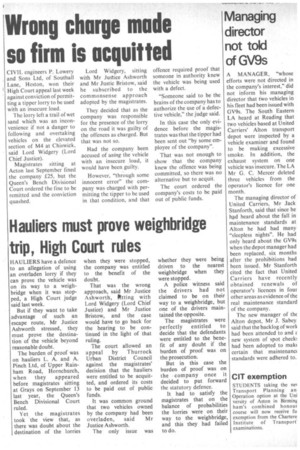Hauliers must prove weighbridge trip, High Court rules
Page 22

If you've noticed an error in this article please click here to report it so we can fix it.
HAULIERS have a defence to an allegation of using an overladen lorry if they can prove the vehicle was on its way to a weighbridge when it was stopped, a High Court judge said last week.
But if they want to take advantage of such an escape route, Mr Justice Ashworth stressed, they must prove the destination of the vehicle beyond reasonable doubt.
The burden of proof was on hauliers L. A. and A. Pinch Ltd, of Upper Rainham Road, Hornchurch, when they appeared before magistrates sitting at Grays on September 13 last year, the Queen's Bench Divisional Court ruled.
Yet the magistrates took the view that, as there was doubt about the destination of the lorries when they were stopped, the company was entitled to the benefit of the doubt.
That was the wrong approach, said Mr Justice Ashworth, Pitting with Lord Widgery (Lord Chief Justice) and Mr Justice Bristow, and the case would have to go back for the hearing to be continued in the light of that ruling.
The court allowed an appeal by Thurrock Urban District Council against the magistrates' decision that the hauliers were entitled to be acquitted, and ordered its costs to be paid out of public funds.
It was common ground that two vehicles owned by the company had been overladen, said Mr Justice Ashworth.
The only issue was whether they were being driven to the nearest weighbridge when they were stopped.
A police witness said the drivers had not claimed to be on their way to a weighbridge, but one of the drivers maintained the opposite.
The magistrates were perfectly entitled to decide that the defendants were entitled to the benefit of any doubt if the burden of proof was on the prosecution.
But in this case the burden of proof was on the company once it decided to put forward the statutory defence.
It had to satisfy the magistrates that on the balance of probabilities the lorries were on their way to the weighbridge, and this they had failed to do.








































































































